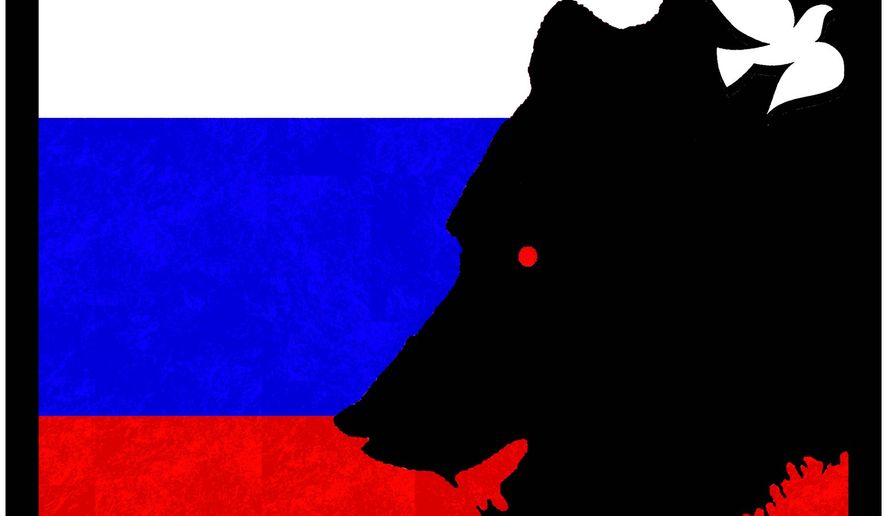OPINION:
The 88th birthday of Mikhail Gorbachev, the last president of the Soviet Union, passed recently without much fanfare. Russian President Vladimir Putin merely sent a customary salutation to the former leader of an empire, the man who gave freedom to 250 million people instead of fighting a bloody power struggle to maintain his own position.
This small but polite greeting italicized a frightening truth: Under Mr. Putin, Mr. Gorbachev’s legacy of peace has been halted. Instead, we may be headed for war.
In his birthday message, Mr. Putin wrote, “It is gratifying that you have not moved to the sidelines, but are actively engaged in expert discussions on key issues of the international agenda and make a significant contribution to developing open substantive dialogue on crucial contemporary matters.” He also wished Mr. Gorbachev good health and high spirits.
The last wish is especially notable. As Mr. Gorbachev watches today’s crumbling global peace, he certainly needs high spirits to remain calm. After all, it was him — a man with an unusual accent and an open smile — who 30 years ago worked with world leaders to assure global peace and avert nuclear war. Today, he is remembered across Russia much like President Ronald Reagan is in the United States.
Today, Russia finds itself in a new Andropov stage — a late Soviet era of Communist Party General Secretary Yuri Andropov, who cracked down hard on civil liberties and freedoms. Step by step, the country is marching toward an uncertain future, descending deeper and deeper to the gutter level of the worst Soviet practices.
The Kremlin has returned to active spy hunts and the selective persecution of American citizens like Paul Whelan, recently accused of espionage, and Michael Calvey, who was arrested on allegations of fraud. Meanwhile, new Kremlin-backed legislative amendments to the criminal code have set up corporate officers for possible arrest and prosecution as organized crime bosses.
We have also restarted a global arms race, essentially invoked in President Putin’s recent speeches to the legislature. His addresses featured animations of Russia’s newest weapons systems, named for mighty Greek gods. Never mind that the Russian defense budget is significantly smaller than that of the United States. Even so, the Russian economy actively finances the development of new weapons, leaving the quality of life of ordinary Russians to rot.
It’s also impossible to ignore the Boeing enigma: The 2014 downing of a Malaysian Airlines Boeing in eastern Ukraine which triggered an escalation of international tensions, just like a similar Korean Boeing incident did in 1983 under Andropov. Sanctions have also become a new-old reality in international relations and shaped Russia’s place in the global legal order.
But what’s most frightening and deplorable is that Russia’s public consciousness has been successfully militarized by regime propaganda. It first proceeded furtively, but on Feb. 23, 2018, we saw this reality rear its ugly head. As part of national Defender of the Fatherland Day celebrations, a St. Petersburg choir put on a serious performance of an old humorous Soviet song about a nuclear attack on the United States. The artists tried awkwardly to dismiss this as a joke, but only made things worse. Today, sometimes not even Russia’s creative class has a grasp of what they are doing.
Our “scientists” are equally oblivious. A planned Moscow State University conference marking the first anniversary of the poisoning of Sergey and Yuliya Skripal in Great Britain lists an ironic discussion topic: “The work of Western special services as it pertains to organizing informational and psychological invasion in the Russian Federation.” But it’s not just ironic. It’s offensive.
I represented the people as a member of the upper house of the Russian parliament, spoke for them in the Federation Council and still feel broadly responsible for their well-being. In this capacity, I can say that my people are infected with the war virus today. I want to grab them by their collars and say: Let’s stop, otherwise, we will all die! Russian poet Alexander Pushkin said it first, and he would again.
We once gulped military consciousness like mother’s milk, because the only reason for the Soviet Union’s totalitarian existence was war. Today, we’re drinking it deeply again. The greatest question is how to stop the militaristic insanity — and that’s a much more difficult question than it may seem.
Perestroika’s 30 years of momentum have been halted, and the premise that the Big War would never happen just because it cannot has become obsolete. Today, the global public is starting to agree with the horrible notion that such a war is possible.
All of us, everywhere, people of peace and good will, must resolve to act. Some may see the age-old struggle for peace as quaint, but it’s not. In the 88th year of Mikhail Gorbachev, the Reaganesque peacemaker, that’s what must return to the global agenda, for the sake of peace on Earth — before it is too late.
• Konstantin Dobrynin is a former senator in Russia’s Federation Council, a vice president of the Russian Bar Association and a senior partner of Pen & Paper, a law firm with offices in Moscow and St. Petersburg.




Please read our comment policy before commenting.